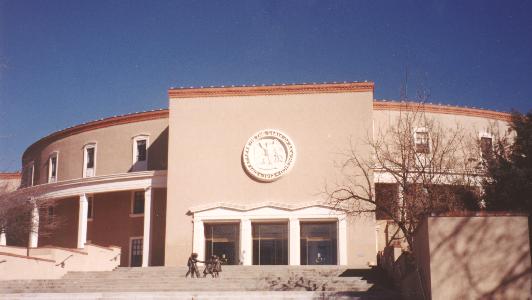|
|
at War with Ourselves America's war on drugs is lost, declares New Mexico's Governor, Gary E. Johnson. The target of that war is now ordinary citizens, he believes. He's eager for us all to see how dishonest, ineffective and discriminatory today's policies are. (Currently, odds are 7 to 1 that the person arrested and serving time for having and using drugs is anybody except a middle class white American. They use the stuff, but they're not the ones going to jail for it.) Don't do drugs! exclaims Gov. Johnson. But if you do drugs that harm only yourself, should you go to jail? His answer: "No." That's a health issue, he contends, not a criminal one. What's criminal and always will be is to do drugs, then harm someone or cause property damage. That's different. Americans, he's found, are beginning to seek new answers while politicians reject obvious ones like his: Adopt harm-reduction strategies so that people plagued by drug-related problems get help instead of punishment. Perhaps legalize marijuana. Put an end to our modern version of Prohibition. And every governor in America faces the same enormous problems. Half of every state's resources are being spent on law enforcement, the courts and prisons. At least half of all prisoners have drug-related problems. So why not help these people instead of incarcerating them? 80,000,000 Americans have used illegal drugs. Governor Johnson -- an avid triathelete who today abstains even from alcohol -- used to smoke marijuana but didn't get caught. Yes, our policies corrupt society, agrees Gov. Johnson, but that's not his thrust. He bases his arguments on harsh realities: Êviolent and property crime; the spread of Hepatitis-C and HIV; overdose deaths; our growing economic dependence on the ever-increasing need for jails in which to house non-violent criminals. Politicians follow, Gov. Johnson reminds us. And we don't have to start from scratch. Successful models exist. In Zurich, Switzerland, even the Chief of Police brags about the positive effects of decriminalizing heroin. (Heroin is administered free to addicts, in clinics.) In Holland, where marijuana is legal, drug use is 60% lower than in America. While Governor Johnson agrees that corruption is the silent partner of today's policies, he sticks to what he considers a reality-based argument. Americans use harmful drugs that kill them. That includes tobacco, alcohol, and prescription drugs, all of which kill in grossly larger numbers than cocaine or heroin. Our demand for drugs keeps the supply coming. So deal with the health issues of drugs we now declare illegal, he urges. Look again at the failed federal drug-related policies. Reclaim the massive resources we now lose. Focus on rehabilitation, education, and treatment -- health issues, not legal ones. Everyone knows who profited from Prohibition in the 1920's. Isn't it time America re-learned those lessons? [This Program was recorded March 12, 2001 in Santa Fe, New Mexico, U.S.]
|








